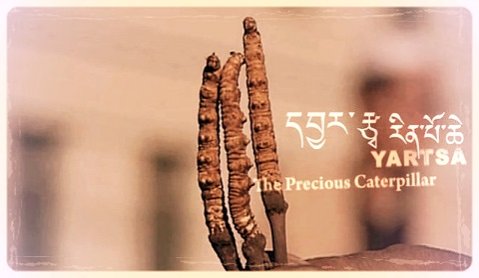Screen/Society--Cine-East: East Asian Cinema (Tibet) --"Yartsa Rinpoche: Precious Caterpillar"

Film Screening:
-- Introduced by Prof. Ralph Litzinger (Cultural Anthropology)
-- Q&A to follow w/ dir. Dorje Tsering Chenaktsang, moderated by Namgyal Tsepak (Anthropology, Cornell University; Trinity ‘10)
Yartsa Rinpoche: Precious Caterpillar
(Dorje Tsering Chenaktsang, 2013, 101 min, China/France, in Tibetan w/ English subtitles, Color, DVD)
"Cordyceps sinensis" (in Tibetan, "Yartsa-gunbu") has been called "Tibet's golden worm" and "The Viagra of the Himalayas." When it was discovered 30 years ago as a natural remedy, it became a boon to Tibetan nomads. Today, some nomadic Tibetan communities bring in as much as 80% of their income collecting it. Yartsa Rinpoche follows Darlo, an elder in the Amdo region, who with his family forms a group of 30 that treks 800 kilometers to collect the "worm," while exploring its larger implications.
About the filmmaker:
Jangbu is the pen name of the Tibetan poet, writer, and filmmaker of Mongolian ancestry, Dorje Tsering Chenaktsang. Considered by many to be Tibet's greatest living poet, he was born in 1963 in Malho (Ch. Henan) Mongol Autonomous County in Qinghai province, a high-altitude grassland area inhabited by Tibetan-speaking communities of Mongolian origin, whose ancestors settled here in the seventeenth century under Gushri Khan. Jangbu, bilingual and educated in both Tibetan and Chinese, began to write modern style free-verse poetry in Tibetan during the 1980s, the era when modern Tibetan literature started to emerge after restrictive years of political campaigns limiting the use of the Tibetan language. Throughout the 1980s, he published in local newspapers and journals and quickly became one of the most prominent poets in Tibet. For several years he worked as editor of the most important Tibetan-language literary journal published in Lhasa, Tibetan Literature and Arts.
During the 1990s he started to travel abroad and has taken part in numerous festivals of poetry and film. He has also worked or cooperated on the production of several documentary films about north-eastern Tibet, perhaps the most important of these, Kokonor, a film about Tibetan forced relocation and the influx of Han tourism at Qinghai Lake. Yartsa Rinpoche is part of his most recent series of documentaries that reflect on social and cultural issues in modern Tibet. Between 2002 and 2008 he lived in Paris, where he taught Tibetan language and literature at the National Institute of Oriental Languages and Civilizations (INALCO) in Paris. He co-wrote the script of Sherwood Hu's acclaimed movie Prince of the Himalayas (2006). The first English translation of his poems and short stories, an anthology of his works titled The Nine-Eyed Agathe, was published by Lexington Books in 2010.
Cost: Free and open to the public
Sponsors: The Asian/Pacific Studies Institute (APSI), the Program in the Arts of the Moving Image (AMI), the Department of Asian & Middle Eastern Studies (AMES), the Office of the Dean of Academic Affairs and Associate Vice Provost for Undergraduate Education, the Duke University Center for international Studies, and the Working Group on Chinese Environmentalism and the Global Anthropocene.
